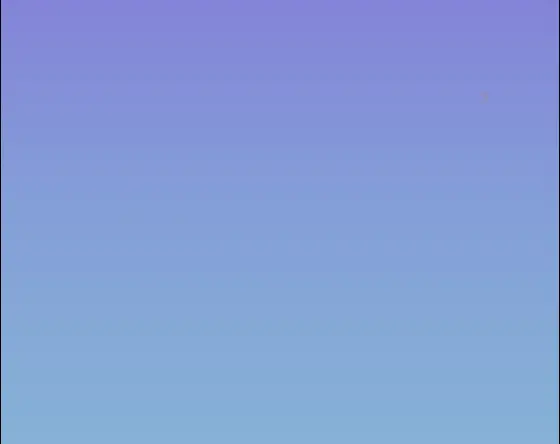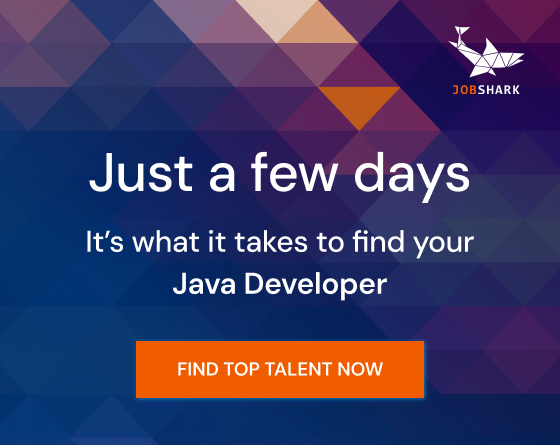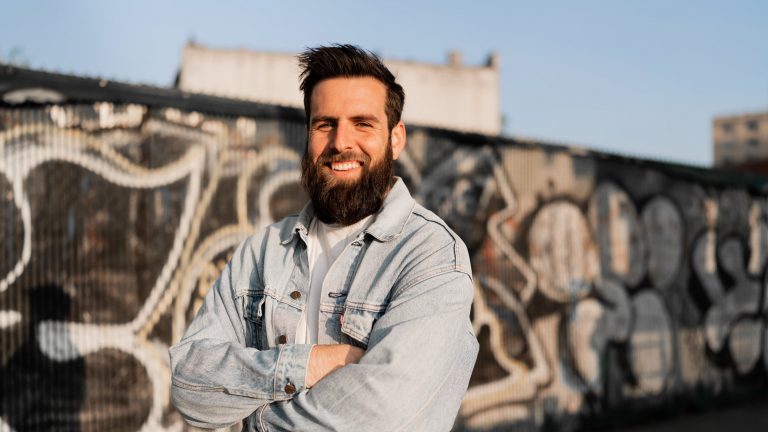While scrolling through Instagram or TikTok, you may have already come across the “European Boss.” The satirical character, always draped in a scarf regardless of the season, embodies a mix of naivety and appreciation for life’s simple pleasures: he is always ready to grant a six-month “plant-ternity leave” for team members caring for houseplants, cancel a meeting just because it’s sunny outside, or take long coffee breaks to debate philosophy with the team — as opposed to his counterpart, the slightly psychotic character of the American Boss.
The European Boss is a standout in the viral video series “Europe vs. America,” created by Dan Pulzello, a producer and content creator from New York. The series has amassed over 100 million views across Instagram and TikTok since its launch in 2021. Pulzello himself is followed by almost 200,000 people on Instagram, and over 50,000 people on TikTok.
With a sharp eye for absurdities in both European and American working cultures, Pulzello blends satire and social commentary to reflect on work-life balance and welfare systems. Through exaggeration and empathy, his sketches resonate with viewers across both continents, who can laugh with characters such as the American Boss, the European Boss, the always-on-leave team member Jürgen, or the burned-out Brian.
In this conversation, Pulzello shares his perspective on why his content strikes a chord, and the pros and cons of both the European and American working cultures.
TechTalents Insights: From your perspective, why are people so interested in the contrast between American and European working cultures?
Dan Pulzello: I think fundamentally it is the difference between the prioritization of quality of life. Europeans prioritize quality of life more than Americans do. So, in all of the comparison videos, there is that simple truth: Europeans care more about quality of life than Americans do. It is obvious to Europeans why you should prioritize quality of life. And I think it’s unfathomable to Europeans why Americans would sacrifice quality of life. I think Americans are more willing to sacrifice quality of life, maybe less aware of how other countries do things. I think there’s a tendency for Americans to think that the way that we do things should be standard — if it is not currently standard — in the world. Also, you got the American exceptionalism as well. But I think the real humor comes from Americans not knowing that this is an abnormal way of working. Europeans are aware that Americans work too hard, Americans are not aware of that fact. And I think that that difference of opinion is where the humor comes from.
TechTalents Insights: What has been your most popular video to date?
Dan Pulzello: My most popular video is the first video in the series, which compared, you know, a European taking hundreds of days of paid time off for holiday and an American getting hit by a car on their way to work and assuring their boss that they will work through lunch to make up for the reason that they were late. That’s the video that kicked everything off. It’s the one that, you know, kind of gave me the idea that this is a topic that is worth pursuing; there were the comments from people saying on the American side, like, “Actually, this isn’t too far from the truth,” sharing their stories of going back to work after surgeries or car crashes or things that were unthinkable. And I thought it was an exaggeration, and then you look into the comments, and it’s actually kind of standard, unfortunately.

TechTalents Insights: Which topic have you found resonates best with your audience, consistently generating a lot of views?
Dan Pulzello: So, I think it’s the relationship between paid time off and kind of that American hustle culture — that’s always a topic. Paternity leave and maternity leave are very big topics. And yeah, I think the, you know, I mentioned it in an earlier answer, but it’s the difference in prioritization of quality of life, and that can just manifest itself in so many different ways. So, as long as I’m getting to that kind of fundamental truth, then everything else I think is negotiable.
TechTalents Insights: Who makes up the core audience of your series? For example, do you tend to reach more Americans or Europeans?
Dan Pulzello: It’s Europeans, mostly, my audience. In America, it’s people who are married to Europeans or married to people who are international or worked at international companies before. Then, in Europe, it’s just like the standard working European who interacts with Americans. I think I can look at the metrics on social media and I think it’s probably like a 70/30 split of Europe versus America.
TechTalents Insights: What are some memorable or unexpected comments you’ve received?
Dan Pulzello: Those are usually in-person comments. So, I’ll do, you know, I’ll do stand-up comedy. My fans will buy tickets to see me, and then I’ll hang out with fans afterwards and do a meet and greet, and those are always very meaningful to me. There was somebody who said, like, “Your videos helped me get through a divorce,” which certainly was not my intention, but was, you know, I think, kind of like, a foundational memory for me as a creator, is like, that there’s value in my work and it can be helpful to people. There was a joke I made about all the upheaval in the world, and I said that the U.S. is heading for the “dumbest apocalypse,” and that was something that a fan in Madrid was like, “Hey, I felt so upset and worried about the world, and you were able to kind of put it into words that were helpful for me.” You never really know how things are going to resonate, but those were two super meaningful in-person comments that were really, really nice.
TechTalents Insights: You’ve had your share of corporate work life working in Sales and Advertising in New York City. How did those experiences shape how you portray corporate culture in your sketches?
Dan Pulzello: I think it was just the lack of irony. People who work at companies in America can really buy into the corporate ethos in a way that Europeans, in general, are kind of distrustful of. I couldn’t believe, you know, how earnestly people were pursuing their sales targets and things like that in the U.S. It was just, you know, there’s no real, I had a hard time with like the inauthenticity of it. It was convincing people to buy things that they might not need or advertising on websites and knowing that the advertising space was wasted by bots and stuff like that. It was difficult for me to find motivation in the way that I think people around me were able to — to derive motivation from those corporate goals in the corporate team spirit. It just always felt really, very, very false to me. And I think satire is my way of saying, you know, that we shouldn’t take these things as seriously as people are taking them. So, I’d say, in professional New York life, there was just no real irony or awareness that this is something that shouldn’t be taken as seriously as it is. I think if you went out to lunch with somebody, you’d be able to get to the truth of it and say, “Hey, let’s stop taking this so seriously and stuff.” But the groupthink in corporate America is stronger than in European culture, from what I can see.
TechTalents Insights: How do you balance comedy and critique when writing these sketches, and how has your approach evolved as your audience has grown — and as the world has shifted — since 2021?
Dan Pulzello: Yeah, I would say, you don’t want to be mean — this is the big thing. I’ve received some comments from people who think that my videos are pro-European or have an agenda that is pro-European as opposed to America. And I think it goes back to the fundamental truth that I believe — that we should all be prioritizing quality of life. Work does not need to be as deadly serious as we make it. So, as long as I am kind of messing around in that space of making sure that me or my characters are the butt of the joke because I think that you never wanna punch down, as we say, in comedy. So, creating characters that are likable, ridiculous — not too harsh, because empathy for the characters is important. So, I would say, it can probably be summed up as: quality of life is important, and don’t be mean to others when you are highlighting that fact. You can debase yourself or institutions that are worthy of critique, but never individuals.
As for how the world has shifted since 2021, I think from what I can tell, the comments people are saying, this hyper-competitive environment is more ubiquitous in Europe. I’ve got people saying, “Oh, in London, we work like Americans,” “In Germany, we work like Americans.” So, I think, unfortunately, from the comments, it seems like it is kind of a movement towards everybody working harder, and I think that you probably got the instability that AI has brought into everybody’s job, like, a general job anxiety that I don’t think existed previously. And yeah, I’d say that it seems like people in general have more job insecurity, which I think is unfortunate.

TechTalents Insights: In a recent podcast you discussed the “psychoticness” of the American corporate culture, but you also mentioned that European working culture is no fairy tale. What cons can you identify in European working cultures? What advantages are there to the U.S. working culture?
Dan Pulzello: From what I can tell, it’s really difficult to start a business and break into the workforce in Europe. It’s what it seems like. I mean, and this is, I cannot stress enough how little I know about working in Europe — I’ve never worked in Europe, I’ve just had interactions with international teams — but in discussing things with my wife, who’s Australian, she jokes that Americans, like, our job titles are made up. I think there’s a flexibility in the U.S. job market. For example, I was a senior video producer for a while. I literally created the role at a company that I was at, and, you know, was able to edit my resumé. I was also like a live stream consultant and creative consultant. There were just so many hats that I wore. And just like, a freedom to pivot as industries. New industries are created in the U.S. and new marketplaces open up and things like that. So, I’d say the flexibility is really cool. I think that flexibility [in Europe] leaves a lot to be desired.
So, I’d say that European working culture, at least in terms of career progression, is more rigid; there is less movement across industries. But I think the floor is lower: I know people who are comedians in Berlin, and they’re like, “Yeah, I’m just going to take a year off from work and focus on my art and comedy and stuff like that; I’ve got health insurance, like, it’ll be alright.”
So that is, you know, that prioritization of, I guess, basic human rights is clearly what is superior about the European system, also the Australian. So, you know, you got some rigidity — like firing people seems to be real difficult, changing careers, pivoting, starting new businesses in Europe seems to be more difficult than in America — but just not having your health insurance tied up to your job seems to be way less stressful, and allows for a level of human dignity that I think it can be lacking in America for sure.

TechTalents Insights: While your videos draw a contrast between American and European work styles, there are cultural nuances within Europe itself. For example, the emphasis on humility and the discouragement of standing out, highlighted in one of your videos, is more present in Nordic countries. Is it correct to consider that your reference for the European working style in the series is Northern Europe?
Dan Pulzello: Yeah, that is specifically a concept that my wife is familiar with called “tall poppy syndrome.” She is Australian; she lived in the UK for a while; I would travel to her in the UK. And that was just like the genesis for me realizing that the US and European working styles are different. Now, the UK is no longer part of the EU, but I think there are similarities there. I’ve had it described as kind of a Nordic sensibility. The purpose of the Europeanness is kind of — I’ve thought of it as just a pan-European vibe. Sometimes, you can get specific within countries, that I kind of shy away from — for example, people’s relationship with food or marriage specifically; it seems like there are just kind of hyper-specific differences depending on which country that you’re talking about. So, I’d say it is correct to assume that it’s kind of, like, a vaguely Nordic sensibility. Again, I’m not an expert on the differences between the European nations. There’s a vaguely German/French accent. So I think the series works because any generalizations that I make can kind of broadly be applied to a bunch of different countries, and it gives me the flexibility to play around in those areas without, you know, specific countries feeling left out or feeling targeted or anything like that.
TechTalents Insights: What traits within Europe have you found most surprising or rich for comedy?
Dan Pulzello: I think the sacredness of lunch will never stop being funny to me: how seriously Europeans take lunch. Cafe culture is endlessly funny to me, and I enjoy it so much [laugh]. And kind of just like a vague baseline knowledge of philosophy, which I don’t think necessarily applies to a ton of Europeans, but that’s certainly like the American view of Europeans — it’s like, “Ah, well, you know, good museums and stuff, read philosophy books.’’ But yeah, as much as I can exaggerate it, the sacredness of lunch and then the sacredness of employees not being contacted after work hours — that is, I mean, to find out that there were laws against that specifically in Germany, people have mentioned it. But even in countries where there aren’t laws against it, it’s just such a social taboo to disrupt somebody’s holiday. The vitriol with which people respond when their boundaries of the holiday or the vacation are breached is very funny to me, and I think I will always be funny, and it was kind of, you know, something I discovered as the series went on.
TechTalents Insights: As your sketches gained traction, brands have partnered with you for product placements. What do they typically look for when collaborating with you?
Dan Pulzello: I’ve got some cool collaborations. First, there is: what do I look for and what do they look for?
I’m not sure what they see in me. I think that humor is generally algorithm-friendly. I try not to touch on topics that are explosive or complicated; just stuff that’s lighthearted. It’s a professional audience, which I think is super valuable to companies — marketing to professionals seems to be a priority. And then, I think, brevity and consistency: most, or all of my videos are under 90 seconds; most are under 45 seconds. So, I think comedy and advertising go hand in hand because it’s like, how can I get my point across in the smallest amount of words and in a way that’s memorable. I think that joke writing can be applied to advertising really easily.
And then, what do I look for in brands I’m collaborating with? I know that’s not the question, but I look for — the biggest one for me is, do no harm. I’ve said no to companies that are like, you know, like vape companies, like electronic tobacco, e-cigs, and, like, big, you know, not sustainable merchandise companies I’ve said no to. So, sustainability is really important to me. You know, advertising software is my niche because I can sleep at night knowing that you know I’m not selling weapons or anything like that. So yeah, just do no harm is my biggest one. Yeah, that’s it.
You clearly have a taste for thoughtful, well-curated content
Don’t pause the momentum — click here and join the TechTalents Insights community and receive bi-weekly trends and expert analysis, free and directly in your inbox.




